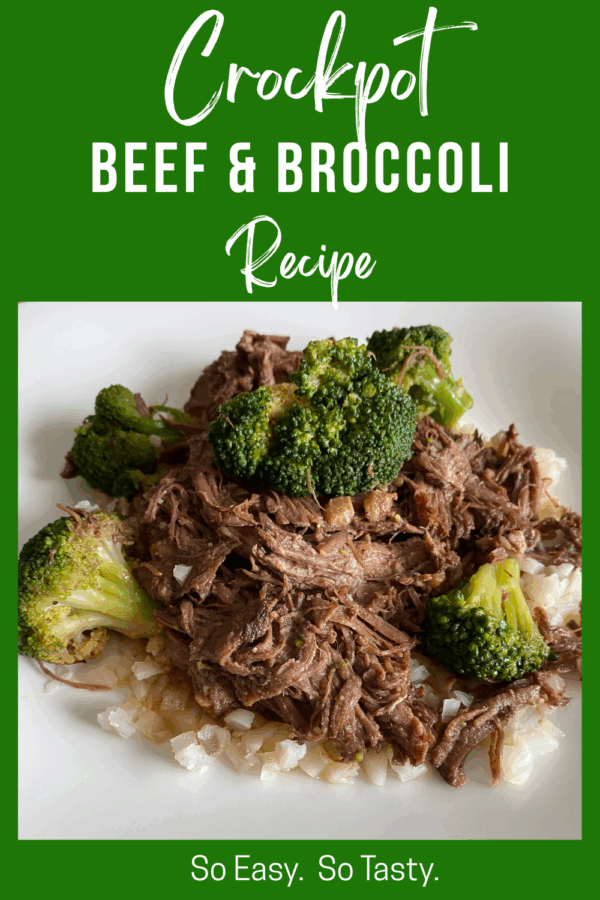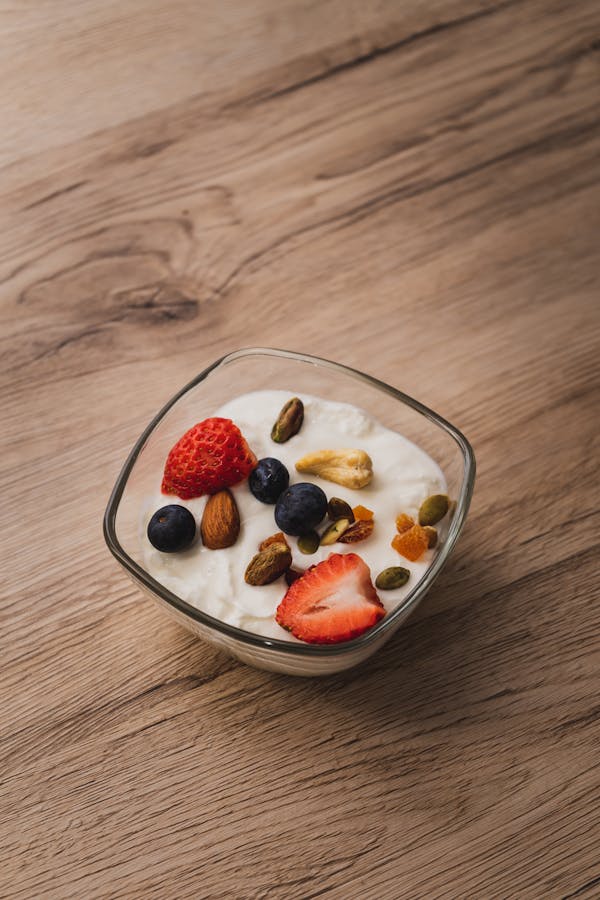
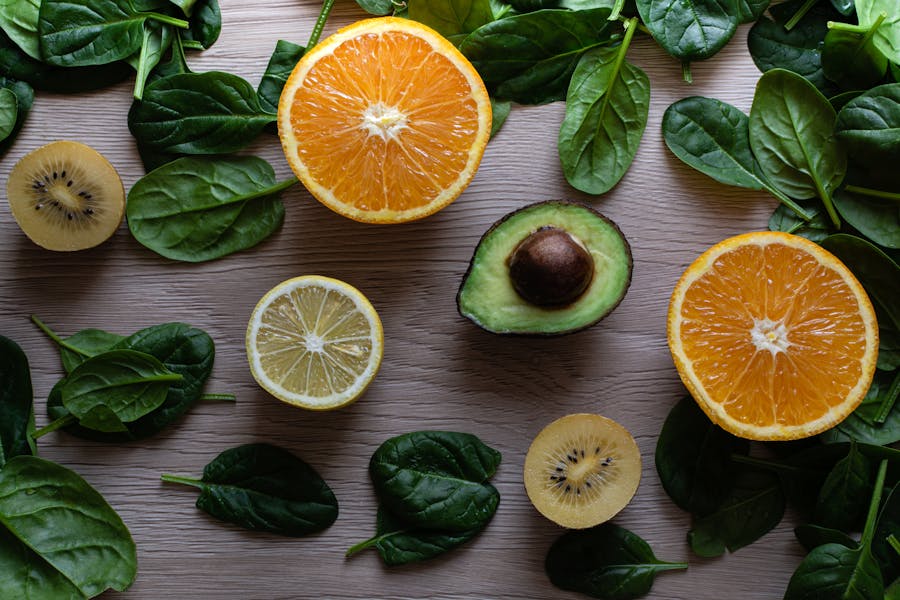

What is the immune system?
According to the NIH, the immune system “protects your body from harmful substances, germs and cell changes that could make you ill. It is made up of various organs cells and proteins.” Maintaining a strong immune system is crucial in protecting the body against infections, diseases, harmful bacteria, viruses, and parasites. A healthy immune system helps the body recognize threatening germs, substances, and/or cell changes and then takes initiative to ward off such foreign substances (known as antigens). Incorporating a balanced diet rich in vitamins, minerals, antioxidants, and proteins plays a key role in building the immune response. Certain foods, due to their nutrient composition, are especially powerful in helping your body ward off infections and illnesses. Let’s delve into why the following foods are excellent (and tasty!) immune boosters.
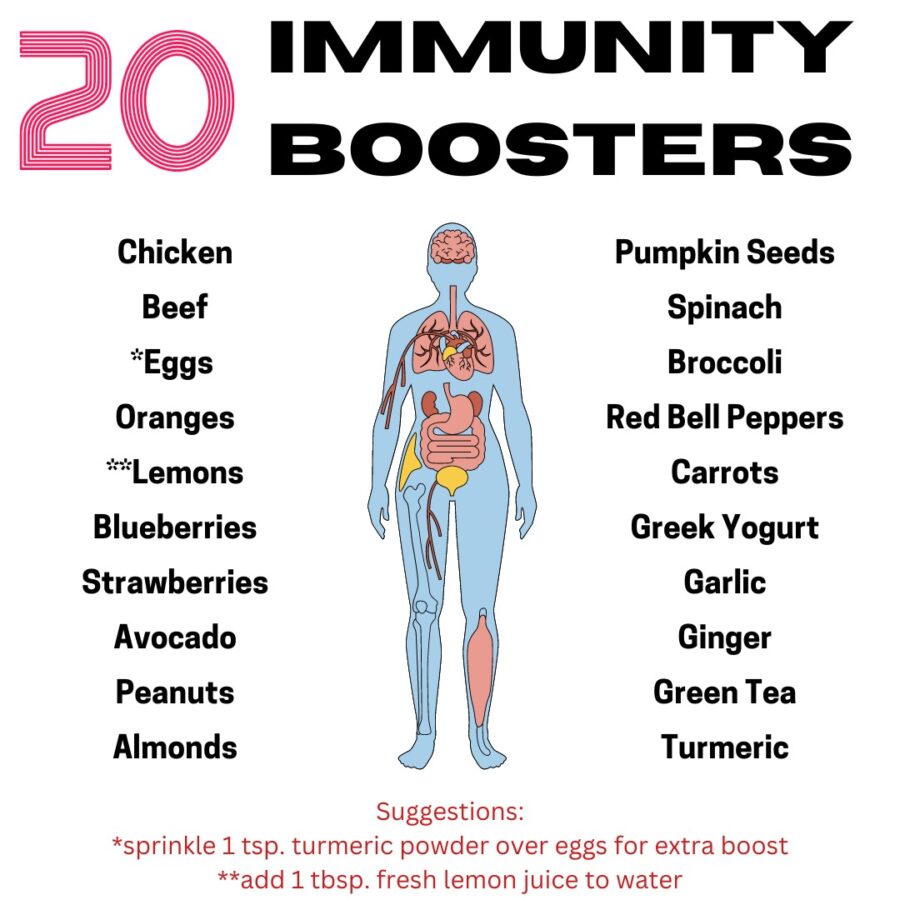
20 Common Ingredients that Strengthen Your Body’s Defenses
1. Chicken
Chicken is packed with protein, a vital component for creating antibodies and repairing body tissues. Poultry is also a source of zinc. Zinc supports the production of immune cells and improves the cells’ ability to ward off infections and defend against bacteria and viruses. Studies have shown that chicken soup, in particular, is known to have anti-inflammatory properties, triggering a more effective immune response to people suffering from a cold.
2. Beef
Beef is another excellent source of high-quality protein and is particularly rich in zinc, iron, and B vitamins (B6 and B12). Protein not only helps produce antibodies to fight off infections and sicknesses, but also creates new cells and keeps current cells healthy. Zinc, as stated above, is important in helping the immune system function properly, while B vitamins are fundamental in producing immune cells.
3. Eggs
Eggs are comprised of a plethora of nutrients that enhance immunity. Not only are they sources of protein but the yolks, in particular, are loaded with essential vitamins and minerals such as vitamin D, selenium, and choline. Vitamin D is a crucial component in immune modulation, aiding the body to fend off viruses and bacteria.
4. Oranges
Oranges are widely known for their high vitamin C content. Vitamin C is a potent antioxidant that supports the immune system by encouraging the production of white blood cells (known as lymphocytes and phagocytes) prompting them to fight off infection. It helps white blood cells function more potently and protects the cells from possible harmful molecules.
5. Lemons
Lemons, like oranges, are loaded with vitamin C, which helps your immune cells get to the site of an infection and then helps those cells eliminate potential illnesses or infections. Lemons also have antibacterial and antiviral properties, making them excellent for warding off colds. Lemon juice helps alkalize the body and is commonly used in detox regimens to support immune health.
6. Blueberries
Blueberries are often referred to as a “superfood” in that this fruit offers high levels of essential nutrients. In particular, blueberries are chock-full of flavonoids and antioxidants, particularly anthocyanins, which bolster the immune system by reducing damage to immune cells. Blueberries are also known for their antiviral properties.
7. Strawberries
Strawberries are also an antioxidant and another excellent source of vitamin C. They also have manganese, folate, and fiber, all of which help your body avoid sicknesses and recover more quickly.
8. Avocado
Avocados are rich in healthy fats, particularly monounsaturated fats, which help absorb fat-soluble vitamins like vitamin E. Vitamin E is an antioxidant that strengthens the immune system by protecting cells from damage. Additionally, avocados consist of other immune system boosters, such as vitamins B6 and C. They are also a source of copper, a significant mineral in keeping your immune system healthy.
9. Peanuts
Peanuts are a good source of protein, magnesium, zinc, and vitamin E. Vitamin E is helps increase T-cell counts, directly destroying infected cells and regulates the immune system. They also contain arginine, an amino acid that supports the immune system.
10. Almonds
Almonds are also packed with vitamin E, which protects cells and assists in fighting off invading pathogens. The healthy fats in almonds help vitamin E absorb more effectively into the body.
11. Pumpkin Seeds
Pumpkin seeds are an excellent source of zinc, magnesium, protein, and healthy fats. Zinc plays a key role in immune cell function and cell growth. Studies find that zinc contributes to reducing the duration and severity of certain sicknesses, such as colds.
12. Spinach
Spinach is a superfood when it comes to immune health. This leafy green is loaded with vitamins C and E, beta carotene, and antioxidants that protect the body from sickness and infections. Spinach is high in folate which is imperative for the production and maintenance of the bodies’ cells.
13. Broccoli
Broccoli is rich in vitamins A, C, and E, as well as fiber and other antioxidants. Evidence shows that compounds such as indole-3-carbinol and diindolylmethane, found in broccoli, have influence over the immune system. Its high levels of sulforaphane is believed to provide a boost to the body’s detoxifying enzymes, which strengthen the immune response.
14. Red Bell Peppers
Red bell peppers contain twice as much vitamin C as citrus fruits, making them a powerful immune booster. They are also comprised of beta carotene, which the body converts into vitamin A. Vitamin A supports healthy skin and mucous membranes, the first lines of defense against microbes.
15. Carrots
Carrots are high in beta carotene, an antioxidant that the body transforms into vitamin A. Vitamin A plays a vital role in maintaining the health of the skin and mucous linings, acting as a barrier to infectious pathogens. Additionally, vitamin C helps build antibodies that defend threats to your immune system.
16. Greek Yogurt
Greek yogurt is rich in probiotics, which are beneficial bacteria that support gut health. Since a large portion of the immune system resides in the gut, consuming probiotics can benefit immune function by improving the quantity of good bacteria. The lining of the gut becomes strengthened, protecting the gastrointestinal tract from harmful viruses or bugs. Greek yogurt also consists of zinc, another immunity enhancer.
17. Garlic
Garlic is loaded with antioxidants and when it is chewed or crushed, releases the compound allicin, which enhances the disease-fighting response of white blood cells when the body encounters viruses. Properties in garlic may resist or destroy infectious microorganisms.
18. Ginger
Ginger is a powerful anti-inflammatory and antioxidant. This spice is comprised of excellent vitamins and minerals, such as vitamins B6 and C, zinc, and magnesium. It helps to reduce inflammation and oxidative stress in the body, both of which can negatively impact immune function. Ginger also has antiviral properties that have shown to fight respiratory infections.
19. Green Tea
Green tea is made from the Camellia sinensis plant. It is loaded with antioxidants like polyphenols, catechins, and flavonoids. Evidence shows that these compounds help in boosting immune function. Green tea also has antibacterial and antiviral properties. Additionally, green tea is comprised of L-theanine, which can aid in the production of immune cells.
20. Turmeric
Turmeric is known for its powerful anti-inflammatory and antioxidant properties, due to the active compound curcumin. It can adjust the immune response and help the body fight infections, which is essential for optimal immune function.
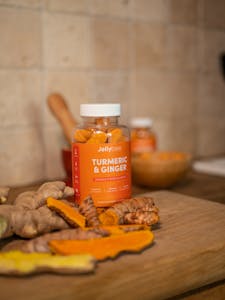
The immune system is a complex network that requires a variety of nutrients to function efficiently. By incorporating these nutrient-dense foods—rich in antioxidants, minerals, proteins, and vitamins—into your diet, you can help strengthen your immune defenses and protect your body against infections and illnesses.
